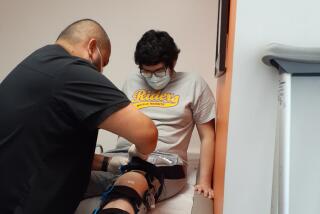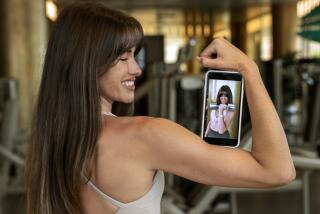Need a trainer? Here’s my card
When I’m at the gym, I invariably spot some poor soul who’s doing something wrong -- performing barbell squats with a curved back, swinging weights around, hyperventilating while running on the treadmill. I know they’re screwing up but I’ve always kept my mouth shut. After all, I didn’t have an exercise science degree or a professional designation that would qualify me to hand out advice.
Until now.
After a lengthy course of study (a couple of hours) and a rigorous exam (open book), I’ve become a certified personal trainer.
Trainers are supposed to teach you the right way to do exercises: keep your knee over your foot when you do a lunge, use the “talk test” to make sure you’re not overdoing the cardio. They’re also supposed to recognize warning signs of overexertion. (Lightheadedness and a beet-red face should raise an alarm, not elicit a “Go for it!”)
But not all trainers are equipped to do these things. Like cellphones and pashmina scarves, these former signs of status and wealth have become just another accessory. And as with all accessories, quality varies.
In fact, many of the form and execution errors I have witnessed have been blithely overlooked, if not encouraged, by the person’s trainer.
Sure, certifications are meant to provide some measure of expertise. But with an estimated 50 to 100 programs certifying about 40,000 to 80,000 personal trainers, the world of fitness certifications is a jumbled and unregulated one. Some certifications are highly regarded and challenging to get; others can be obtained by any biped, courtesy of an Internet test or a weekend seminar. Nor are gyms always the best protector of their clients’ interest. Most require their trainers to have certifications to prove competence -- and for insurance purposes -- but not all. Chains such as Bally Total Fitness, for example, have an approved certifying-organization list that includes the American Council on Exercise and the National Academy of Sports Medicine, two respected institutions. Other gyms may ask only for a sheet of paper that contains the words “fitness,” “trainer,” and “certified.” Still others weigh education and experience as much or more than the certification.
Eric Schmitz, general manager of the Santa Barbara Athletic Club, says he rejects about half the job applications he gets because of certifications’ dubious quality.
“Just having a certification doesn’t train somebody to be a trainer,” he says. “You can really hurt somebody.”
Of course, no one wants a trainer who’s going to make them bench press 150 pounds when they haven’t exercised in 20 years -- the point of fitness is to feel better, after all. But the potential for harm is more serious than aching muscles or a sore ego.
Trainers also may be working with people with underlying heart disease or undiagnosed diabetes, said Dino Costanzo, chairman of the committee on certification and registry boards for the American College of Sports Medicine. Loading too much weight or pushing too much cardio could have a disastrous effect, such as a heart attack.
State licensing could help, but such efforts are nascent at best. Louisiana requires licensing of clinical exercise physiologists who work in places such as cardiac rehab facilities, and Massachusetts has a similar bill pending.
If licensing of gym-variety trainers happens, it’s probably years away, although Costanzo thinks it could be a good thing: “Talk about where licensure should happen,” he added. “They’ve got their hands on the public.”
Until then, it’s every would-be trainer for herself.
My certification is from the International Fitness Assn., which has been around for about 10 years and offers online certifications for aerobics instructor and personal trainer (that’s the one I got), sports nutritionist and senior fitness instructor. You can also become a master fitness instructor, master sports nutritionist and master senior fitness instructor. Those sound really cool and I would have gone for master trainer, but it had essay exams.
Really, I just wanted to gauge the limited knowledge sometimes required to call oneself a “personal trainer.” That -- and a piece of paper that allowed me to start sentences with, “Well, I’m a certified personal trainer, and ...”
It required $124 and an open book, 100-question, true/false and multiple choice test. I downloaded the “Fitness ABCs” from the website and kept that on my computer screen as I took the exam.
Some things I knew, such as, “Caffeine has the effect of stimulating the cardiovascular response.” (Duh, that’s why I drink it.)
But on many questions I was stumped, such as “Muscles require adenosine triphosphate (ATP) for both aerobic and anaerobic activity” (true) and “Lactic acid and heat are the byproducts of aerobic exercise” (false; the byproducts are heat, water and carbon dioxide).
After a while, I realized the exam was testing my ability to read and understand English more than it was testing my knowledge of anatomy and physiology. If I wasn’t sure about something, I’d find the corresponding chapter in the “book” and scan it until I found the answer. Ask me the same questions now and I’ll answer with a blank stare. It’s all gone.
I finished in about two hours (including bathroom and snack breaks) and scored a stunning 97%. I couldn’t wait to get my suitable-for-framing certificate and wallet-size certification cards. (The bonus window decals were a delightful surprise.)
With my new certificate I thought about all the unsolicited advice I could bestow, the unwitting people I could whip into shape. To find the best way to segue into my new role, I called a few people who had similar credentials.
Rebecca Bays took the IFA test (and passed) because she wanted to work as a trainer at a local gym in North Carolina and thought a national certification would look good on her resume. She got the gig.
She has no illusions, however, that the Internet exam alone qualified her to train people. She is currently studying for her American Council on Exercise certification and is already certified by local law enforcement to teach physical and tactical training at law enforcement academies, a certification she said was “a lot more in depth” than some other credentials. “If I didn’t have the background I do,” Bays said, “the test would not be nearly enough. Anybody who stops at just the test is cheating themselves. The test doesn’t give you enough to be an effective personal trainer.”
Carrie Pullaro also was certified through the Internet exam and landed a trainer job at a local gym in Florida. Although she said her education and weight-training experience helped her get the job, she’s still a bit unnerved by the simple process.
None of her clients, she said, “asked me about my certification. That bothered me. It would be the first question I’d ask.”
James McGrath, who just took the test last week and plans to canvass gyms near his Connecticut home for aerobics instructor jobs, has no such qualms about his credential. He liked the speediness of the certification and the fact that he could do it on his own time.
Besides, McGrath said, he’s coached boys’ boxing, has taken hip-hop dance classes and is currently studying figure skating and CPR training. “Providing I have my CPR training, I feel pretty confident that I could get a job,” he said.
Chuck Krautblatt, president and chief executive of Florida-based IFA, agrees that it’s fairly easy to ace an open book test, but adds, “We certify your academic credentials, but it’s like getting your medical degree -- no hospital is going to hire you as a doctor. In the fitness industry, they wouldn’t bring you in without being in some type of apprentice program.”
Well, maybe some gyms would.
Which brings us to the better-safe-than-sorry lesson for the day: Check your trainer out before you lift one dumbbell. Ask about education, experience, insurance -- and if the certification took several months to get or a couple of hours on the computer.
As for me, ultimately, I’m not sure if I’m ready to make the next move to an apprenticeship. I already have a full-time job and, frankly, training might take the fun out of working out. But now that I’m officially certified, I might say something to that guy who’s always doing the lat pull-downs too quickly.
And when I do, I’ll be sure to show him my card.


